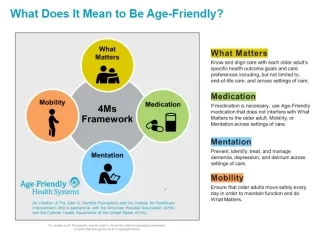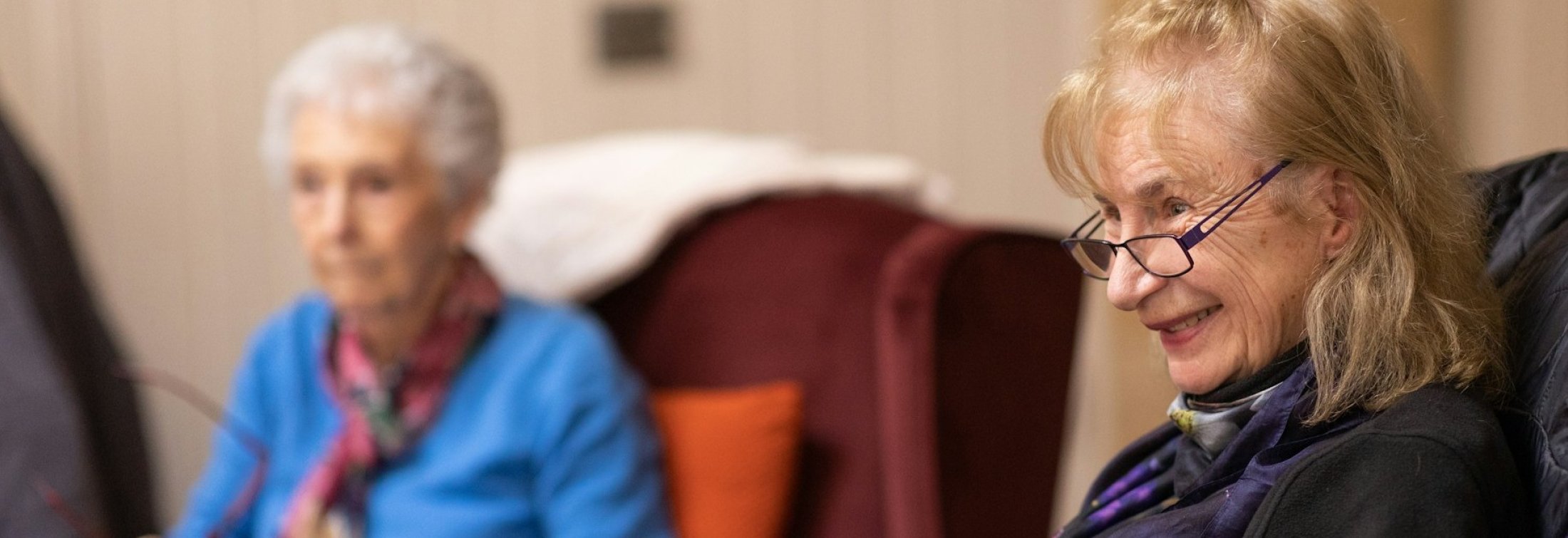Summary
- Josselyn Winslow advocates for better health care for older adults and people living with dementia. She said, “Too often, as we age, the world starts to overlook us, and I refuse to be invisible.”
Josselyn Winslow is over 90 years old and believes in showing up each day. That’s how she has lived: one day at a time and making each count. She realized long ago that her most important job was to take care of herself, stay healthy, and keep moving forward. For Josselyn, moving forward includes advocating for better health care for older adults and those living with dementia. She is a role model for promoting age-friendly and dementia-friendly care.
In the 1980s, when the term “Alzheimer’s” was hardly understood, Josselyn cared for her mother, who developed the disease. “Back then, Alzheimer’s was something people rarely talked about,” she recalled. “It was almost a whispered word, like cancer used to be.”
A portrait of Josselyn Winslow, an advocate for better care for older adults and those living with dementia. “The Art of Aging,” 2021
Building Connections and Support
With her caregiving experience and needs, Josselyn and her husband, Frank, along with other people in the community, founded the Alzheimer Society of Washington in 1983. Over time, the organization grew into what it is now Dementia Support Northwest (DSNW), providing vital resources for people living with dementia and their caregivers. She emphasized that it was and still is a collective effort involving family members, spouses, children, parents, and all caregivers, working together to provide better dementia care and support more people.
Amy’s Place, the new headquarters for DSNW and the dementia-friendly community hub.
In May 2025, DSNW opened Amy’s Place, a dementia drop-in center in the local mall. Designed as a welcoming environment, Amy’s Place provides caregivers and individuals with dementia a safe place to connect, seek support, and foster open conversations.
"Judy Davis, our Executive Director, has led the growth of our organization," Josselyn shared. "Under her leadership, we now have a 5,000-square-foot space." The facility is designed to be both functional and welcoming, featuring a spacious main gathering area as well as private rooms for visitors who need a quieter setting. The center is open Monday through Friday from 10:00 AM – 5:00 PM.
Amy’s Place features a variety of dementia-friendly activities, including a dedicated two-hour session for respite care. It is the kind of place Josselyn wishes had existed when she was caring for her mother. “It was amazing and incredibly helpful to see everyone from the support group with their partners, sitting together and having meaningful conversations,” she added. Josselyn volunteers there and welcomes those in the area to stop by and say hello.
In March 2025, Josselyn brought her experiences and interest to the Washington State Dementia Innovations Summit, hosted by the Dementia Action Coalition. As a supporter of age-friendly care, Josselyn shared a story about a recent visit to her primary care physician for her annual examination. She told her physician, “I want you to know what matters most to me. Too often, as we age, the world starts to overlook us, and I refuse to be invisible.” Her focus on what matters aligns with the 4Ms Framework of an Age-Friendly Health System: What Matters, Medication, Mentation, and Mobility.

Figure 1. 4Ms Framework of an Age-Friendly Health System
Using the 4Ms to Guide Care
Josselyn believes that the 4Ms of age-friendly care align with the person-centered, holistic care she tried to provide for her mother decades ago. Drawing from her experience and conversations in support groups, she emphasizes the importance of individuals taking the lead in discussions with doctors. It's essential to understand what care is needed, where to access care, and how to keep the whole family healthy. Caregivers must be able to communicate clearly with health care providers and stay informed. For her, Age-Friendly Health Systems isn’t just about her own care. She noted that when 4Ms care is considered together, the full framework provides clear direction for optimum health care for older adults, and certainly for people living with dementia.
For her own health care, Josselyn noted that focusing on what matters helps to ensure her independence by having her voice heard in health care decisions. When it comes to medication, Josselyn said she is intentional about what she takes and why. “I have learned how important it is to understand every medication: how it affects me, how it supports what I want to keep doing,” she explained. She carefully manages medications to maintain her interaction with her family, her community, and her organization’s work. Her awareness of the distinction between depression, delirium, and dementia reflects her insight into mentation (or mind).
“People lump together these like they’re the same, but they are not. Each one needs a different approach,” she said. Josselyn also talked about coping with arthritis and how she keeps moving, understanding that mobility is key to her quality of life.
Lessons Learned
Josselyn’s experience and advocacy bear many lessons for age-friendly care, including:
- If you don’t see it, start it. At a time when knowledge and information about dementia was lacking and there were few opportunities to connect, Josselyn and her husband helped build an organization and a caring community.
- Recognize the role of caregivers. People who provide caregiving or other support are a vital part of the health care team. Environments like Amy’s Place offer resources for both people living with dementia and those who care for them.
- Talk about what matters. My Health Checklist is a guide that can help everyone follow Josselyn’s example of thinking and talking about the 4Ms with their health care providers. The guide is free and available in English, Chinese, Portuguese, and Spanish. Being prepared for health care conversations helps people and their health care team focus on the things that matter most.
Josselyn’s story is an example of the power of integrating 4Ms into health care to support her own health and improve the lives of people living with dementia and their caregivers. As she emphasizes, it can be hard to navigate the health care system for anyone, especially those living with dementia. She hopes that by embedding age-friendly care into dementia care, navigating the health care system will become easier.
Nafasya Ramadini Maura, MS, AMIPR, is a Graduate Communications Intern at The John A. Hartford Foundation (JAHF). Jane Carmody DNP, MBA, RN, FAAN, is a Senior Program Officer at JAHF.
Photo by Centre for Ageing Better on Unsplash
You may also be interested in:
